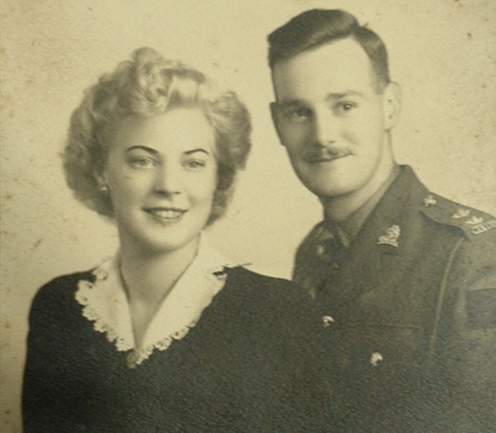Tom St. Amand and Tom Slater
The house was in ruins, but he found a box to sit on and placed a blank sheet of paper on a rickety table.
It was February 1945, war-ravaged Germany.
When he picked up his pen in the candlelight, Lieutenant Bill Graham, 26, couldn’t have known he had just days to live. He had no idea when he started writing another letter home that he would never see again his beloved wife, Dorothy, or their baby daughter, Susan.
He knew only that when Dorothy received the letter she would realize he was safe.
A closing line carried an assurance: “We’ll all be together soon. Kiss Susan for me, darling.”
The letter was mailed on February 24, 1945. On the morning of March 2, during the Battle of the Rhineland, a German mortar bomb exploded near Bill Graham in Hochwald Forest. He died instantly.
People who served with Lieutenant Graham spoke of his competence and his bravery. His letters home portrayed a loving husband and proud father, a professional soldier who served his country admirably, but one anxious to return home.
Tall and handsome, Graham was the sort of man who remained calm in trying times, or “reliable and inspiring confidence,” as one officer put it.
He needed those qualities as a sergeant-major during the Dieppe Raid of August 1942, when he and his brother Jack were with the Essex Scottish regiment. Bill Graham returned to England safely, but Jack was captured and remained a prisoner until the war’s end.
In 1943, Bill Graham wrote to his parents in Sarnia that the nightmare of Dieppe still stayed with him.
He also disclosed that he was recommended for a commission in Canada. During his return, he married the lovely Dorothy Davies in London on May 21, 1943. Bill’s affectionate nickname for Dorothy was “Doodie” and the young couple was ecstatic when they learned she was expecting six months later.
Graham desperately wanted a little girl and received his wish when Susan was born on September 3, 1944. He was attending the Officer Training Centre (OTC) in Brockville at the time and in October he was transferred to the Canadian School of Infantry in Vernon, BC.
One instructor noted Bill was “quiet, not easily excited . . . well liked by his men [and] capable of leading an infantry platoon.”
After receiving his commission as a lieutenant Graham was recalled overseas and he left on Christmas Day, 1944.
His letters came often, the homesick lieutenant providing snippets of news and much affection.
Jan. 22: “Your description of Susan’s first Christmas made me feel I could see all the things she received.”
Jan. 30: “There is no fun in being so far away and depending on snaps to watch your daughter growing up.
Feb. 6: “Oh happy day! I received a letter this evening. Believe me, darling, I wish I was home too.”
His final letter said: “It will be so nice to settle down and live peaceful, normal lives again. I adore you, my dear wife.”
Then came Hochwald Forest, and the letters stopped.
Four days after Lieutenant Graham died a letter from Doodie arrived, bearing two small snapshots—one of a Christmas tree and the other of baby Susan. The big news was that Susan, whom Bill affectionately called “The Pablum Eater,” had rolled over in her playpen.
“I love you with all my heart. Susan and I will be waiting right here for you,” Doodie wrote.
The letter was returned to Doodie stamped: “Reported Deceased.”
Lieutenant Bill Graham is buried in Groesbeek Canadian War Cemetery, Netherlands.


